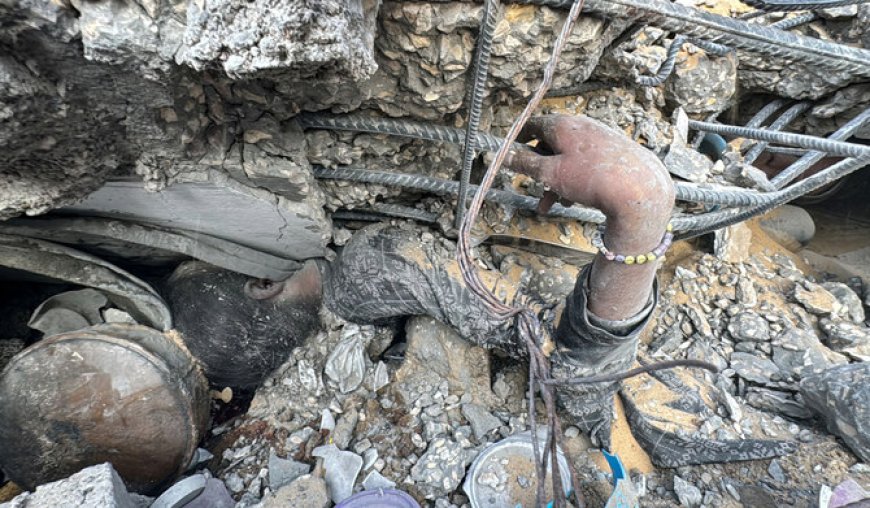Northern Gaza Sees Worsening Hunger and Desperation as Siege Continues Unabated
The near-total blockade of food and supplies is making an already dire humanitarian situation even worse as Israel's shelling rages on in northern Gaza.

The near-total blockade of food and supplies is making an already dire humanitarian situation even worse as Israel's shelling rages on in northern Gaza. Amidst the destruction of their houses, tens of thousands of Palestinians have been left to starve for nearly a month as the northernmost sections of Gaza have been shut off from crucial resources. Because they can't get their hands on clean water or food, many families have no choice except to risk their lives digging through trash cans and other abandoned buildings for any crumbs they can find, such as lentils, wheat, or canned goods.
Those who have stayed put are fighting an uphill battle for their lives every day. The only thing more devastating than the bombings that have leveled entire districts is the sheer despair felt by people who are fighting to survive the siege. "We are being starved to force us to leave our homes," Mohammed Arqouq, a resident of northern Gaza, said, describing the misery of seeing his family suffer. Here in our homes, we will die. As a result of the Israeli military's embargo on northern Gaza, his family and thousands of others like them have no way to get aid.
Tragically, medical personnel at Gaza City's hospitals are unable to cope with the inflow of malnourished children. Nutritionist Dr. Rana Soboh sees 350 instances of severe malnutrition daily at the Patient Friend Benevolent Hospital in Gaza City; many of these cases involve northern youngsters. Bones showing through emaciated skin, bulging eyes, and extreme frailty are all signs of the physical toll these kids have taken. As a disturbing indicator of the toll the siege has taken, one mother said that her pregnant daughter weighed only 40 kilograms (88 pounds) at three months of pregnancy.
All around the area, things are looking quite bad. There is still a huge disparity between the amount of humanitarian aid that is required and the amount that is actually provided, even though the deadline for the Biden administration's demand for more aid is drawing near. Famine, according to the UN, could be on the horizon in northern Gaza, yet just a small percentage of the food and supplies that are desperately required are making it there. Despite the United States' call for 350 relief trucks to help alleviate the crisis in Gaza, the UN reports that only 37 vehicles have entered the territory daily since October.
Unfortunately, help is frequently intercepted or blocked even when it does enter the border. Israeli forces stopped a convoy delivering food to the already devastated town of Beit Hanoun, according to the World Food Programme. As a result, the trucks had to empty their cargo before they could reach shelters. Many are wondering if the food was purposefully withheld from individuals who were most in need because it is unknown what happened to the goods after that.
Arqouq and other northern Palestinians are now living off the scraps. A widow named Um Saber and her six children are among forty displaced individuals who share a residence. "We are like dogs and cats searching for food in the rubble," she said. Tragically, her story is not uncommon. Lentils and flour are being shared among neighbors as people limit what little they have, but the danger of famine remains constant. There may be occasions when absolutely no food is available.
Although the Israeli military maintains that these actions are aimed at weakening Hamas and securing the area, many Palestinians believe that Israel's real goal is to drive a large number of people north of the border, which some view as a strategy to eventually depopulate the region. The Palestinians are facing a precarious situation as the northern blockade continues to tighten. They can either move to the south, where the situation is slightly better, or remain and face the grim prospect of famine or bombardment.
The political backdrop, with the Biden administration currently facing a crossroads, is exacerbating the human cost of this siege. The United States has demanded greater aid for Gaza, but thus far, its demands that Israel permit more humanitarian relief have met with little success. The aid flow is still much below what is needed, despite Israel opening a few new crossing sites. The US administration's unwillingness to hold Israel accountable for its part in making the humanitarian crisis worse has cast doubt on its dedication to protecting human rights despite the immense suffering that has befallen the world.
Things are only going to become worse when winter rains roll in. Waste is flowing down the walls of the destroyed classrooms where people are seeking refuge, according to the UN, because basic sanitary services are overburdened. The situation is just as dismal in Gaza City, where displaced families are surviving on scraps and building makeshift homes out of the rubble of their destroyed houses. The once-thriving metropolis now seems like the ruins of a long-gone civilisation.













































